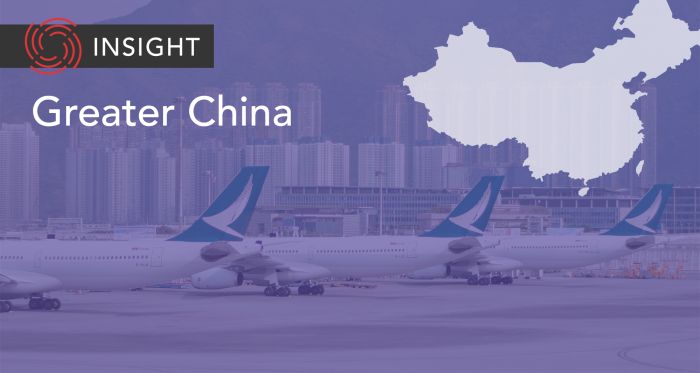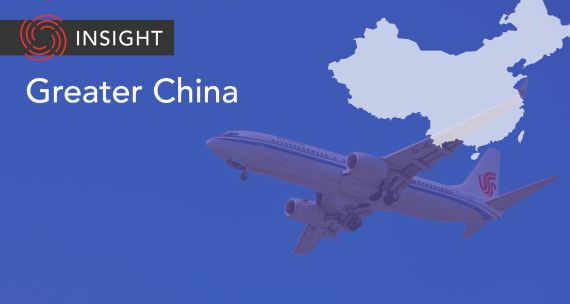The Takeaway
Cathay Pacific Airways, Hong Kong’s biggest airline, is facing a reckoning after a complaint about its flight attendants teasing Mandarin speakers went viral online. As Cathay navigates the fallout — and struggles to restore services and staff following pandemic-related disruptions — the airline must also position itself, delicately, as a pro-Beijing, Hong Kong-based business, adding a complex layer to how the company deals with its customers, staff, and the broader public in China and Hong Kong.
In Brief
On May 23, Cathay Pacific dismissed three flight attendants for making derogatory remarks towards several non-English-speaking passengers during a May 21 flight from Southwestern China’s Chengdu to Hong Kong. The incident was recorded and uploaded to Xiaohongshu, China’s equivalent of Instagram. In one exchange, the three attendants can be heard poking fun at a passenger who confuses "blanket" with "carpet" in English. The post noted that the attendants also ridiculed an older passenger who neglected a safety instruction announced in Cantonese.
The blunders fuelled a backlash online, with Mandarin-speaking ‘netizens’ from mainland China, Taiwan, and Southeast Asia sharing unpleasant experiences of their own while flying with Cathay Pacific. Hong Kong’s Chief Executive John Lee demanded that the corporation "improve its customer service culture" to "restore [Hong Kong's] respectful and hospitable image." Official voices from Beijing also criticized the airline: the People’s Daily, a Chinese Communist Party (CCP) media outlet, called on the airline to stop "worshipping the West."
After issuing three apologies between May 21 and 23, Cathay Pacific Airways CEO Ronald Lam gave an in-person apology in Mandarin on May 24, vowing to lead a task force to review workflow and training programs. The corporation’s Flight Attendants Union (FAU), however, blamed management for failing to facilitate a "reasonable work environment," and asked it to protect staff from passengers' "provoking behaviours."
Implications
Cathay’s latest controversy comes as the airline deals with a severe staff shortage. Hit particularly hard by the COVID-19 pandemic, in 2021, the carrier operated with 40 per cent less staff than it did in 2019. Hong Kong’s strict COVID-19 travel measures and the resulting near-total loss of air traffic led to mass layoffs, slashes in pay, and resignations. Cathay’s recent decision to cut the number of cabin crew members on each flight increased the workload for employees (who have already had their pay cut), deflating staff morale. In response, in January the FAU initiated a ‘work-to-rule' campaign, discouraging crew members from working more than the minimum stipulated in their contracts. Low morale and the work-to-rule campaign haven't helped the airline boost its reputation, performance, or brand image over the last five months.
The incident in May reflects the oft-forgotten nuances of Hongkongers’ perceptions of China, including the latter’s tightening control over the former. Cathay Pacific, whose two biggest shareholders are British conglomerate Swire Pacific (45%) and China’s flag carrier Air China (29.99%), has been caught in the middle at times: In 2019, Beijing blacklisted some Cathay staff members from China-bound flights over their participation in “violent” anti-extradition bill demonstrations in 2019. Answering Beijing's call, Cathay warned it would fire employees if they sided with the protesters, resulting in a slew of resignations, including the airline’s then-CEO. The company’s new leadership warned employees to "be mindful" about what they post on social media and encouraged staff to report any "serious wrongdoings" by their colleagues. The most recent flashpoint for the company concerns the use of Mandarin. After a three-year near-absence from outbound tourism, mainland Chinese travellers are back. But Mandarin-speaking visitors have long complained about facing intra-racial “discriminations” in Hong Kong for speaking Mandarin rather than Cantonese or English.
The Chinese central government's drive for greater integration with Hong Kong — including a push to speak Mandarin in Hong Kong — has made some Hongkongers squeamish. Some of these same Hongkongers equate supporting the three fired flight attendants with supporting Hong Kong’s unique culture and the status of Cantonese. Moving forward, companies will have to balance respecting Hong Kong's uniqueness with toeing the CCP's line.
What's Next
1. Cathay looks to recruit more Mandarin speakers
On May 24, Cathay CEO Lam confirmed that Cathay will expand its hiring efforts in the Greater Bay Area, likely leading to an increase in the proportion of Mandarin-speaking flight attendants. This change, however, may mean current staff will have to navigate new changes and language-related uncertainties.
2. Passengers take rows to the internet
A recent and related case of alleged verbal abuse also made waves on China’s internet: a China Southern Airlines employee, based at Singapore's Changi Airport, reportedly ignored and insulted a Mandarin-speaking customer. As language-based discrimination receives more scrutiny online, service-sector companies like Cathay will be pressured to, as Lam described, “address . . . something much deeper.”
3. Privacy vs. workplace conduct
Some ‘netizens’ supporting the Cathay attendants accused the passenger of recording and posting the audio clip without permission, calling it an “immoral” infringement of privacy. While the act is unlikely a violation in Hong Kong’s context, those supporting the passenger hit back at the FAU’s statement that making such remarks in the professional setting is simply inappropriate.
• Produced by CAST's Greater China team: Maya Liu (Program Manager) and Dustin Lo (Analyst).




